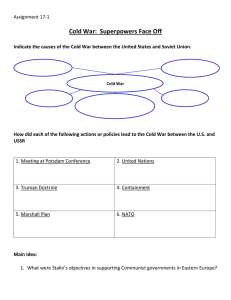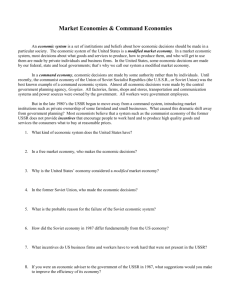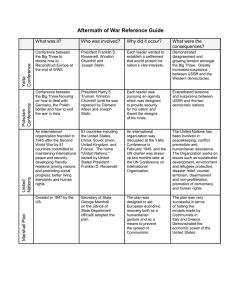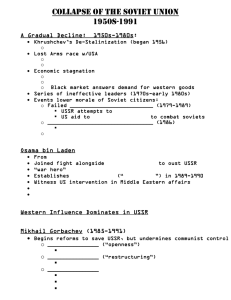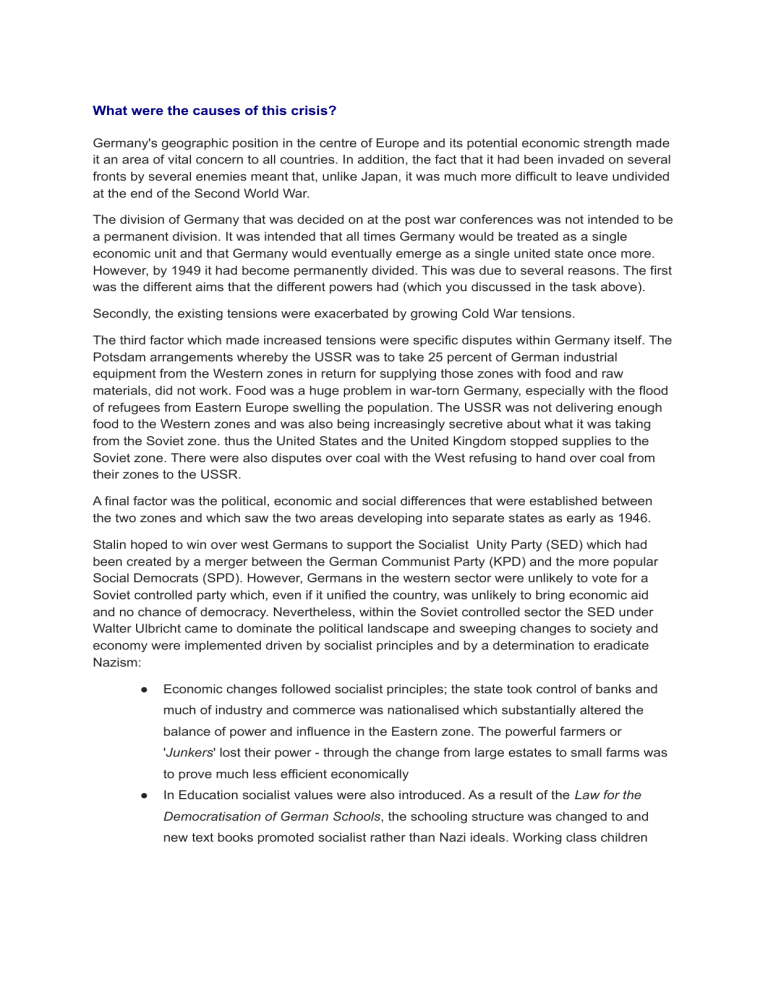
What were the causes of this crisis? Germany's geographic position in the centre of Europe and its potential economic strength made it an area of vital concern to all countries. In addition, the fact that it had been invaded on several fronts by several enemies meant that, unlike Japan, it was much more difficult to leave undivided at the end of the Second World War. The division of Germany that was decided on at the post war conferences was not intended to be a permanent division. It was intended that all times Germany would be treated as a single economic unit and that Germany would eventually emerge as a single united state once more. However, by 1949 it had become permanently divided. This was due to several reasons. The first was the different aims that the different powers had (which you discussed in the task above). Secondly, the existing tensions were exacerbated by growing Cold War tensions. The third factor which made increased tensions were specific disputes within Germany itself. The Potsdam arrangements whereby the USSR was to take 25 percent of German industrial equipment from the Western zones in return for supplying those zones with food and raw materials, did not work. Food was a huge problem in war-torn Germany, especially with the flood of refugees from Eastern Europe swelling the population. The USSR was not delivering enough food to the Western zones and was also being increasingly secretive about what it was taking from the Soviet zone. thus the United States and the United Kingdom stopped supplies to the Soviet zone. There were also disputes over coal with the West refusing to hand over coal from their zones to the USSR. A final factor was the political, economic and social differences that were established between the two zones and which saw the two areas developing into separate states as early as 1946. Stalin hoped to win over west Germans to support the Socialist Unity Party (SED) which had been created by a merger between the German Communist Party (KPD) and the more popular Social Democrats (SPD). However, Germans in the western sector were unlikely to vote for a Soviet controlled party which, even if it unified the country, was unlikely to bring economic aid and no chance of democracy. Nevertheless, within the Soviet controlled sector the SED under Walter Ulbricht came to dominate the political landscape and sweeping changes to society and economy were implemented driven by socialist principles and by a determination to eradicate Nazism: ● Economic changes followed socialist principles; the state took control of banks and much of industry and commerce was nationalised which substantially altered the balance of power and influence in the Eastern zone. The powerful farmers or 'Junkers' lost their power - through the change from large estates to small farms was to prove much less efficient economically ● In Education socialist values were also introduced. As a result of the Law for the Democratisation of German Schools, the schooling structure was changed to and new text books promoted socialist rather than Nazi ideals. Working class children now had more opportunities and the number going to university almost doubled in three years. Meanwhile, in the Western sector a range of political parties developed, though there was an attempt to ensure that there was no repeat of the fragmentation of parties that had happened in Weimar Germany. The SDP and KPD were re-established but did not merge as had happened in the East. The various Christian (Protestant and Catholic) and conservative parties joined together to form the Christian Democratic Union (CDU) led by Konrad Adenauer. Liberal parties formed the Free Democratic Party. There was no attempt to remodel the Western zone socially and economically such as had happened in the Eastern zone. Nevertheless, the American influence - for example via the Marshall Plan, meant that as Mary Fulbrook writes, 'West Germany [was set] on the course of a moderate, liberal-conservative form of western capitalism'. (Germany 1918 - 1990, pg 158). The West had also given more priority to maintaining professional expertise in economic and political areas and in ensuring economic growth rather than in pusuing deNazification too thoroughly. Activity Review your notes on the Yalta and Potsdam conferences 1. What decisions were taken at Yalta and Potsdam regarding Germany? 2. In pairs, discuss the aims of each of the following powers regarding Germany. Also discuss why they had these aims. USSR ● France ● USA ● Britain Here I wrote some suggestion you can go through -The USSR did not wish to see a resurgent Germany which could threaten it again. It also wanted to secure reparations - as much as possible - in the range of US $20 billion -France also feared a strong, united Germany again -The USA saw that a strong, economic Germany was key to the peace and stability of Europe; it also increasingly saw a strong economy as key to resisting communism (hence the Marshall Plan after 1948) -The UK endorsed the US point of view as it was dependent on US aid.
